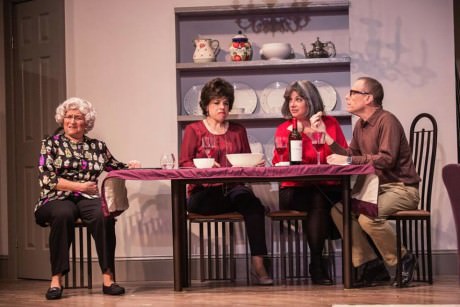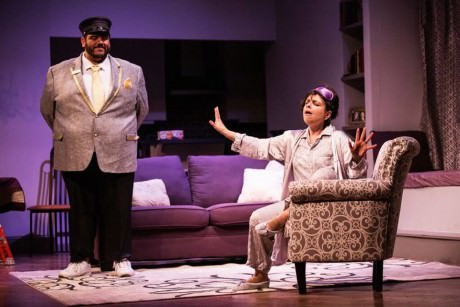Herman Hesse was once – and for all I know still is – highbrow chic. Marjory Taub (Karen Jadlos Shotts) – heroine of Charles Busch’s The Tale of the Allergist’s Wife, directed by Michael Kharfen — is well-read and a Hesse “expert,” though the precise nature of his appeal to her is left somewhat undeveloped in the script – I assume her obsession with Hesse is meant to underline both the credibility and the flaunting pretentiousness of her intellectual life.

Hesse was a twentieth-century German/Swiss Protestant pietist cum Buddho-Vedantic literary mystic voyager and Marjorie’s a contemporary New York secular Jewish housewife, but I want to suppose there’s some kind of deeper connection between the two. Both could be placed in that category of “beautiful soul” whose confessions one may have encountered in Goethe’s Willhelm Meister, in the Jansenism of Port-Royal, and in those gnostic mystery cults pervasive here and there in philosophic antiquity. If it seems like I’m dropping names and pretentious cultural references, that’s a propos of Marjorie, who’s all but made that practice into a skilled performing art. She cites the classics of Western tradition almost as frequently as Tevye the dairyman quotes the Bible.
There is in fact something rather old-fashioned and old-world about Marjorie, and I would like to think that having lost the mameloshen of her ancestors she hasn’t lost the Yiddish soul, be it the yearning fervor of the Hasid or the Talmudic assiduity of the Litvak. She may be the allergist’s wife, but I suspect she’s also the rabbi’s granddaughter. Even if she does eat cake on Yom Kippur and never found a goyish cultural indulgence she didn’t dig. Her strictly observant daughter, who’s become religious, married a rabbi, and moved to Israel, seems strange to her, a fanatic; though Marjorie’s equally puzzled by her West Coast daughter, a wild child who’s lately taken up New Age healing. Marjorie’s still pretty conventional.
Needless to say the “beautiful soul” is a fish-out-of-water in 21st century America, which is far too cynical and pragmatic for such hapless dreamers. That’s why Marjorie’s in the throes of a nervous breakdown as the play begins. She’s read too much, she’s volunteered too much, she’s invested all this energy into becoming the sort of person she thinks she needs to be, and to what avail? She’s worth nothing, has done nothing, is an intellectual and personal fraud – all this, of course, is in her head, as she suffers a “dark night of the soul” or a midlife crisis. Being a high-flying intellectual isn’t for her, she tells her husband, Ira (Jack Stein); they’re still just peasants from the shtetl, made for plowing dirt.
To make things worse – or better, given the minute or day – is Marjorie’s doting, overbearing mother, Frieda (Janice Zucker), who lives in a studio apartment just down the hall. Frieda is more proudly Jewish than her impassioned, culturally-uprooted daughter. She’s not any more sane but she is more down to earth.
Ira, Marjorie’s husband – the allergist – is a retired, stable — if fidgety — do-gooder. He’s a highly-regarded professional, volunteer doctors for the poor, and is a frustrated comedian. He’s personable, but not exactly exciting. He loves his wife dearly, she loves him, and you can sense the couple’s mutual frustration.
Enter Marjorie’s long-lost childhood friend, Lee Green, née Lillian Greenblatt (Marianne Meyers) – in contrast to the housebound Marjorie, who moved from the Bronx to Manhattan then around the corner to somewhere else in Manhattan, Lee’s been everywhere, knows everybody, has done everything. She hobnobs with the Gorbachevs and Michael Jackson, was present for the fall of the Berlin Wall, and Tiananmen Square; had bit parts in some of Marjorie’s favorite art films, and had an affair with a famous German writer, Gunther Grass.
The entrance of Lee threatens to turn Marjorie’s life upside down. As it happens, things don’t quite develop that way, though Lee’s presence does throw a wrench in Marjorie’s routine. The benevolence of Lee’s return to Marjorie’s life is mixed; you shall have to see the play to find out the details. At least Marjorie is brought out, higgedly piggedly, from her slump.
The Little of Alexandria’s production of The Tale of the Allergist’s Wife is very well done. The casting and direction are superb, the actors shine from start to finish. They are animated, they have accents, they fill the room with a nervous energy that makes one laugh. And there are lots of laughs.
Karen Jadlos Shott’s Marjorie is frazzled, neurotic, and loveable despite herself. Janice Zucker’s Jewish mother is frustrating but reassuring, in a jumpy mother-hen sort of way. Jack Stein’s Ira is surprisingly fun – this is a role that could have been bland, but in Stein’s portrayal the good doctor’s almost as entertaining as the comic he never quite was able to be.
Marianne Meyers plays Lee Green with the brash, bold confidence the part demands. She’s annoying and wins you over at the same time. There is a dark underside to this character, something ominous that Meyers really captures.

Omar Rocha, who plays the Iraqi-born doorman, Mohammed, is new to the LTA stage, and, according to the program notes, this is his first stage role since appearing in a few plays in his youth. That’s surprising, because Mr. Rocha has a very compelling stage presence, and he brings to the role of quiet, generous Mohammed a genial grace that leaves one hoping to see him back for more.
The set design, by Dan Remmersa, is — as is usually the case at the Little Theatre of Alexandria — of a very high-quality, more naturalistic in its aims than not. From floor almost to the ceiling, the stage looks like a real apartment. I assume it’s the kind one finds in the nicer parts of Manhattan. The best part of the set is a window that looks out over the trees in Central Park, the leaves of which are turning autumn colors. The light is what impresses – it almost looks like real daylight, with a slight touch of enchantment. Otherwise, the lighting is bright and unobtrusive. My hat’s off to Lighting Designer Marzanne Claiborne, Costume Designer Ashley Amidon, Set Painter Diedre Nicholson Lamb, and and the entire team of designers and stage managers.
Running Time: Two and a half hours, with one 15-minute intermission.
The Tale of the Allergist’s Wife plays through November 14, 2015 at The Little Theatre of Alexandria – 600 Wolfe Street, in Alexandria, VA. For tickets call the box office at (703) 683-0496, or purchase them online.
LINK:
Cast and crew interviews can be found on the LTA’s Blog.
NOTE:
A digression on the title: The meaningful tale (German: märchen, Hebrew/Yiddish: ma’aseh/mayse) is as woven into German and Jewish cultures as these are omnipresent in the script of the play. The märchen has been an exceptional means of German literary expression; not only the Brothers Grim, but Goethe, Novalis, and E.T.A. Hoffman wrote masterpieces of the form, and Kafka was much influenced. Even today, certain schools of psychology probe into the classic fairy tale to unlock the secrets of the subconscious mind. Ethnologists do the same, to discover quintessential values and trace cultural origins. We read these stories to our children, tell them again by fireside and hearth, and recast them into stage musicals and Disney cartoons. In Jewish history, story and anecdote have always been chosen vehicles for handing down the tradition, even of passing on divine secrets – from the Biblical narratives to Rabbinic commentary-by-story, from esoteric mysteries to the lives of the Hasidic wonder-rabbis, there is no end to the telling of tales in Jewish culture, a practice that holds out the promise of infinite depths.
That’s one reason I was a little disappointed with this play. The Tale of the Allergist’s Wife is a title that seems to suggest one is in for something more meaningful that sitcom humor and rehashed ethnic jokes. That’s pretty much what the play delivers. Judged by that standard, however, it succeeds admirably well in the first act, which is a highly focused send-up of modern urban Jewish life. It’s a broad, type-based comedy – more Sholem Aleichem (ninety years on) than Chaim Grade, if one wanted to be generous and put it in Yiddish literary terms. The second act is kinkier, meanders, and seems guaranteed to offend potential highly-sensitive audience members of various stripes. Not being one of those, I had a very good time.





